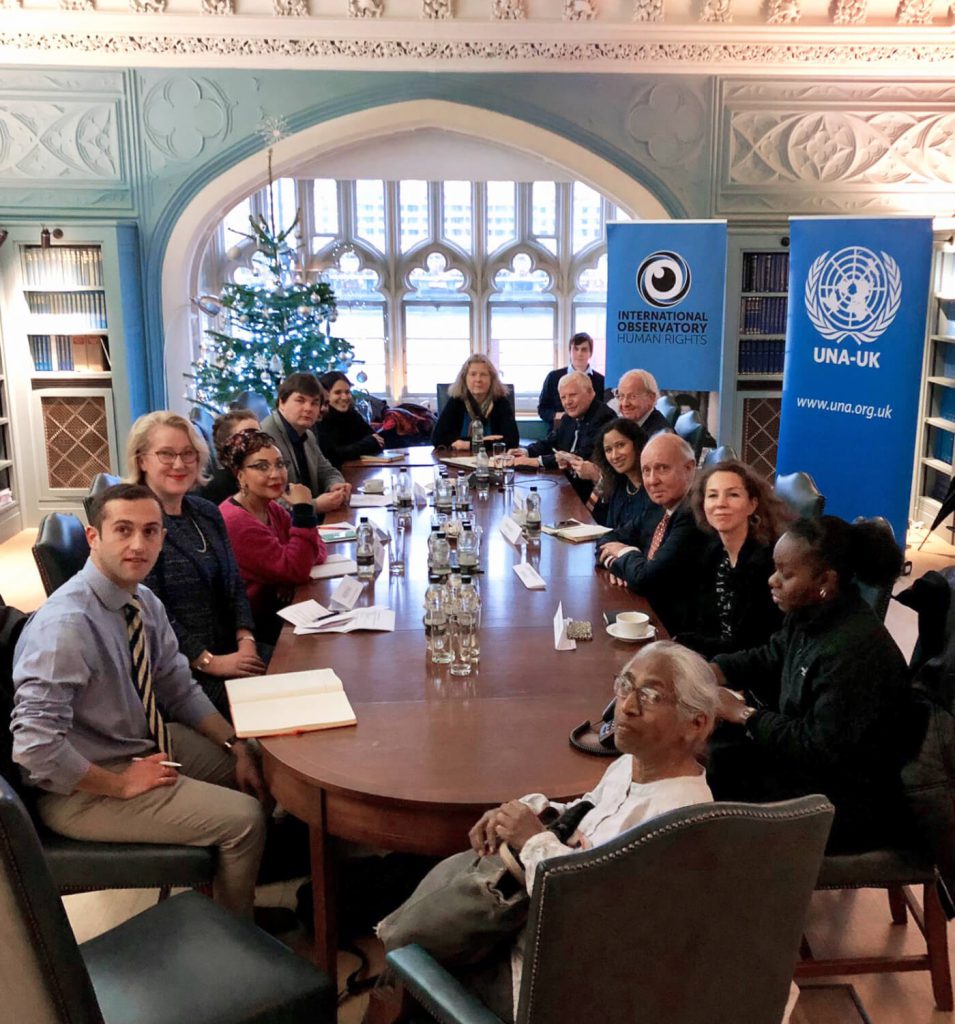- The International Observatory of Human Rights teamed up with the United Nations Association – UK (UNA-UK) to host a roundtable discussion to celebrate Human Rights Day 2019 which year marks the 71st anniversary of the Universal Declaration of Human Rights.
- This round table was convened at Carmelite Chambers in London to discuss human rights funding allocation by the new UK government.
- In 2018 the UK government spent approximately £42.8 million on human rights This was just 0.33% of the £14.5 billion spent on Official Development Assistance (ODA) in total.
A new UK Government will shortly have the opportunity to address the role of the UK in upholding human rights; regardless of the county’s position within or out of the European Union. There has been concern of a weakening of the multilateral approach in the global arena in the past few years and the impact this has had on funding of human rights related issues.
The International Observatory of Human Rights partnered with the United Nations Association – UK on Human Rights Day to hold a dedicated round table to discuss the needs for funding in the sector. The round table was hosted in the Library of the prestigious Carmelite Chambers in central London. Participants included legal and academic experts, NGOs and those with government experience.
Fred Carver, Head of Policy at UNA-UK made the case for the pledge, incorporated in their recent foreign policy manifesto, that 1% of Official Development Assistance (ODA) should be ring fenced for human rights programming, in order to ensure that human rights is sufficiently resourced and placed at the centre of the development agenda:
“The Sustainable Development Goals represent a human rights framework for development. But unless human rights processes are sufficiently resourced there is a risk that this will be lost, to the detriment of development as a whole”

The outcome of the discussion had some significant points to raise: –
- A call for a more cohesive approach in government and to examine the inter relationship of funding across government departments. This highlighted the need for greater transparency of allocation to ensure that crucial areas of support are not lost among more popular campaigns and that the government can be held to account that money allocated to human rights related activities are not syphoned off at a later date for other purposes.
- The need for transparency of how to access funding for those local organisations delivering service directly on the ground. This was coupled with the need to distribute this funding and show consistent reporting of results to ensure continued support and de risking of similar activities.
- The need to understand that human rights underpins international development and therefore there should not be tension between funding one and the expense of the other, as they are intertwined. There was a call to review the manner in which development spending was allocated, ensuring that human rights is placed at the heart of development approaches, which otherwise might be put under pressure by Governmental requests to ensure that development improves trade
- The need for all participants in human rights funding to address the language so that it is accessible for the public to understand the issues being funded and to have more accountability for the government to deliver on them in relation to the SDG goals.
In conclusion, Valerie Peay, Director of IOHR, addressed the need to clearly articulate these asks in the coming weeks as the new government shapes its plans for 2020.
“human rights is the foundation of a balanced society. We have a responsibility to work together with the UK government and international bodies to ensure that there is clarity, consistency and coordination in place to make every penny count to deliver the best outcomes”.
